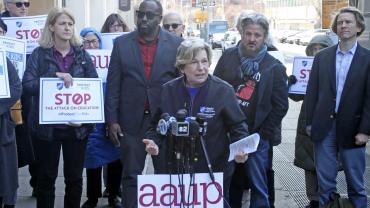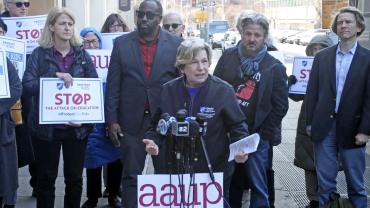A colleague said recently to me that the abandonment of vocational education was one of the great errors in American education in the past generation. I recall when New York City had successful high schools that prepared students for vocations and careers that paid well. The concept of “college for all” undermined support for such schools, and most of them closed.
A few days ago, Randi Weingarten wrote an article in the New York Times endorsing CTE–career and technical education--a cause she has been supporting for years. CTE is an updated term for vocational education. One of the r big complaints about vocational education was that students were being trained to service obsolete machinery. CTE incorporates the latest technology into its curricula.
Isn’t it time to recognize that electricians, plumbers, nurses, computer technicians, auto mechanics, and other skilled occupations are needed as much and often paid more than those with a Ph.D.? To be clear, I admire those who spend years to acquire a doctorate in the liberal arts, but the reality today is that most college professors are underpaid adjuncts.
We should recognize that education is a lifelong endeavor. Everyone needs a strong foundation from K-12 in the skills of reading, writing, thinking, and using technology, as well as a solid grounding in mathematics, civics, history, the sciences, and the arts. Students should graduate high school ready for college or careers. They should be ready to make choices and able to change course, which many adults do.
Randi writes:
For years, America’s approach to education has been guided by an overly simplistic formula: 4+4 — the idea that students need four years of high school and four years of college to succeed in life.
Even with this prevailing emphasis on college, around 40 percent of high schoolers do not enroll in college upon graduating, and only 60 percent of students who enroll in college earn a degree or credential within eight years of high school graduation.
While college completion has positive effects — on health, lifetime earnings, civic engagement and even happiness — it’s increasingly clear that college for all should no longer be our North Star. It’s time to scale up successful programs that create multiple pathways for students so high school is a gateway to both college and career.
More than 80 percent of America’s young people attend public schools, and the challenges many students and their families face are well known. Chronic absenteeismworsened during the pandemic. For many reasons, the country’s lowest-performing students are being left behind. Cellphones and social media have helped fuel an epidemic of bullying, loneliness and mental health struggles among youth. Educators, who have less and less authority in their classrooms, are valiantly fighting those headwinds, too often with insufficient resources.
So far, President Trump’s response has been to order the dismantling of the Department of Education and to propose billions of dollars of cuts to K-12 education that will push our system of public schools closer to the breaking point.
Republican-led states are increasingly embracing school vouchers, which let parents spend public funds on private schools, despite evidence of the negative effect of vouchers on student achievement: Evaluations of vouchers in Indiana, Louisiana, Ohio and Washington, D.C., show that these programs can cause drops in test scores. And vouchers divert vital funding that could and should go to public schools. Arizona is spending millions of dollars on vouchers for kids already attending private schools. Students in Cleveland’s public schools may lose up to $927 per pupil in education spending to vouchers each year.
I propose a different strategy: aligning high school to both college prep and in-demand vocational career pathways. Just as students who plan to go to college can get a head start through Advanced Placement programs, high schools, colleges and employers should work together to provide the relevant coursework to engage students in promising career opportunities.
I’m not suggesting reviving the old shop class, although there is value in aspects of that approach, including hands-on learning. We’ve got to shed the misperception some may still have of technical education as a dumping ground for students headed for low-skill, low-paying jobs.
I taught social studies and A.P. government in a career and technical education, or C.T.E., school. My students not only prepared for careers in health care such as nursing; they also had robust discussions about the Constitution and won national debate competitions. I have seen innovative programs throughout the country, which show that high schools — with work force partners — can prepare all students for a variety of careers and fulfilling lives whether they go on to four-year or two-year college or training for a variety of skilled trades and technical careers.
In April, I attended the opening of a C.T.E. high school, RioTECH, in Rio Rancho, N.M. RioTECH is a partnership between the public schools and a local community college, with support from industry partners and the local teachers union — an affiliate of the organization I lead, the American Federation of Teachers — giving students the opportunity to earn stackable credentials in high-demand skilled trades as well as tuition-free, dual-credit classes that count for both high school and college credit.
The Brooklyn STEAM Center is a public school at the Navy Yard that partners with businesses, public high schools and the local union, the United Federation of Teachers. Students there have access to internships and apprenticeships and the potential of full-time jobs with more than 500 businesses on site. Career pathways include cybersecurity, construction technology and computer-aided design and engineering.
In Newark, students at the Red Hawks Rising Teacher Academy can enter a no-cost, dual-enrollment program in partnership with Montclair State University, Newark Public Schools and the A.F.T. This high school experience with a high-quality teacher preparation program helps create a pipeline to educate, train and retain future teachers, and to diversify the teacher work force.
Last year, the A.F.T. and two affiliates began an advanced technology framework with Micron and the state of New York in 10 school districts, now expanding to districts in Michigan and Minnesota, with federal funding. In this program, high school students acquire technical and foundational skills, creating pathways to middle-class jobs in the microchip sector that often won’t require a four-year college degree.
More than 90 percent of students who concentrate in career and technical education graduate from high school, and about three-quarters of them continue their education after high school. Research shows that career and technical education has positive effects on students’ academic achievement, high school completion and college readiness…
Ensuring all students get a great public education takes resources, which is why Mr. Trump’s planned cuts are just plain wrong. The Senate passed a resolution this year “supporting the goals and ideals of ‘Career and Technical Education Month’”; a similar resolution is pending in the House. Now it’s time for Congress and the administration to offer tangible support for those goals in the federal budget.
Rather than undercutting the Education Department, or using the challenges that public schools face as a rationale to cut vital federal funding under the pretext of sending more authority to the states (which already have most of the authority for schools), why not support and scale practices, policies and programs that will make our schools more engaging and relevant to more students?


